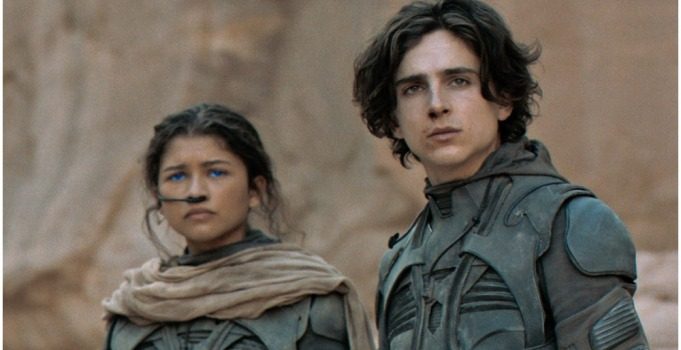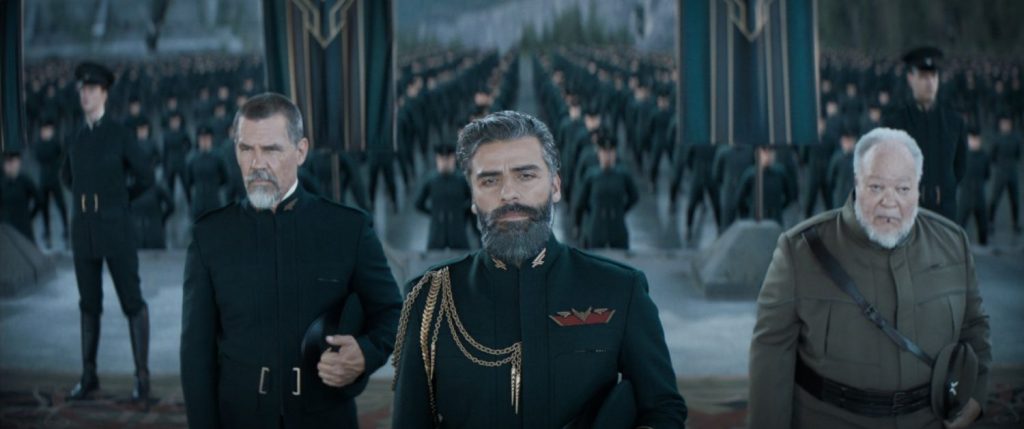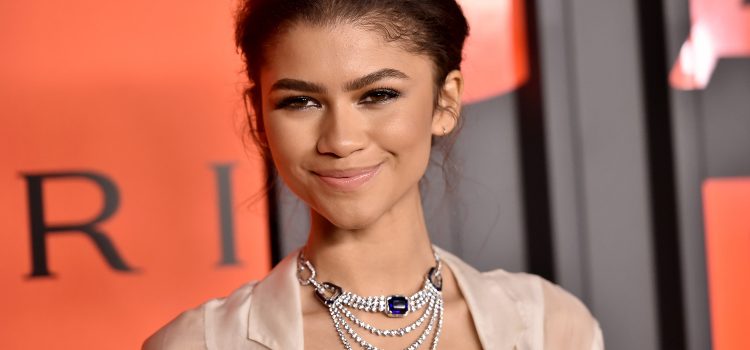By Lynn Venhaus
For 10 days preceding the 94th annual Academy Awards on March 27, we are spotlighting each of the 10 Best Picture nominees.by running a review from when the movie opened locally, and then add awards season news and other tidbits.
A mythic hero’s journey, “Dune” is the big-screen adaptation of Frank Herbert’s seminal 1965 bestseller about a feudal interstellar society in a galaxy far, far away, which is set in a distant future. It’s the story of Paul Atreides, a gifted young man born into a great destiny beyond his understanding.
As part of the noble house of Atreides, he must travel to Arrakis, the most dangerous planet in the universe for the future of his family and people. The desert wasteland planet has an exclusive supply of “mélange,” aka “the spice,” a drug that extends life and enhances mental abilities. As it is the most precious resource in existence, malevolent forces are at work to prevent this, and only those who can conquer their fear will survive.
The sci-fi action adventure was released in St. Louis on Oct. 22, and starred Timothee Chalamet, Oscar Isaac, Rebecca Ferguson, Zendaya, Josh Brolin, Stellan Skarsgard, Dave Bautista, Jason Momoa and Javier Bardem.
It is rated PG-13 for sequences of strong violence, some disturbing images and suggestive material, runs 2 hours and 35 minutes, and is directed by Denis Villeneuve.
One of the films delayed by the COVID-19 pandemic, it was originally scheduled for a late 2020 release, but finally premiered at the Venice International Film Festival on Sept. 3, 2021, and was released in the U.S. Oct. 22 in theaters and streaming on HBO Max.
The film was generally well received by audiences — grossed $400 million worldwide on a production budget of $165 million. Many critics cited its visuals, scope, and ambition, A sequel is set for release next year, Oct. 20, 2023, covering the second half of the book.
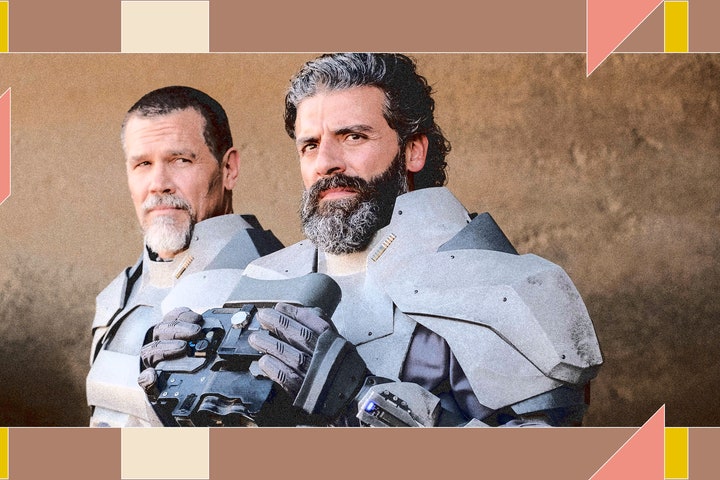
2021-2022 Awards:
“Dune” was nominated for 10 Academy Awards, including Best Picture, Adapted Screenplay, Cinematography, Score, Sound, Editing, Costume Design, Production Design, Visual Effects and Hairstyling and Makeup.
It won five at the BAFTAs: Cinematography, Original Score, Sound, Production Design and Special Visual Effects.
Greig Fraser won for feature film from the American Society of Cinematographers.
On Rotten Tomatoes, 84% of 468 critics’ reviews are positive. I gave it a B, but agree on the technical aspects. The consensus was presented as thus: “Dune occasionally struggles with its unwieldy source material, but those issues are largely overshadowed by the scope and ambition of this visually thrilling adaptation.”
Audiences polled by CinemaScore gave the film an average grade of “A–”
Of the groups I belong to, It won three from the Critics Choice Association – for Production Design, Visual Effects and Original Score, with six other nominations. It was nominated for three EDA Awards from the Alliance of Women Film Journalists, for Adapted Screenplay, Cinematography and Editing. and it won two – Visual Effects and Score from the St. Louis Film Critics Association, with six other nominations – Adapted Screenplay, Cinematography, Costume Design, Director, Editing and Production Design.
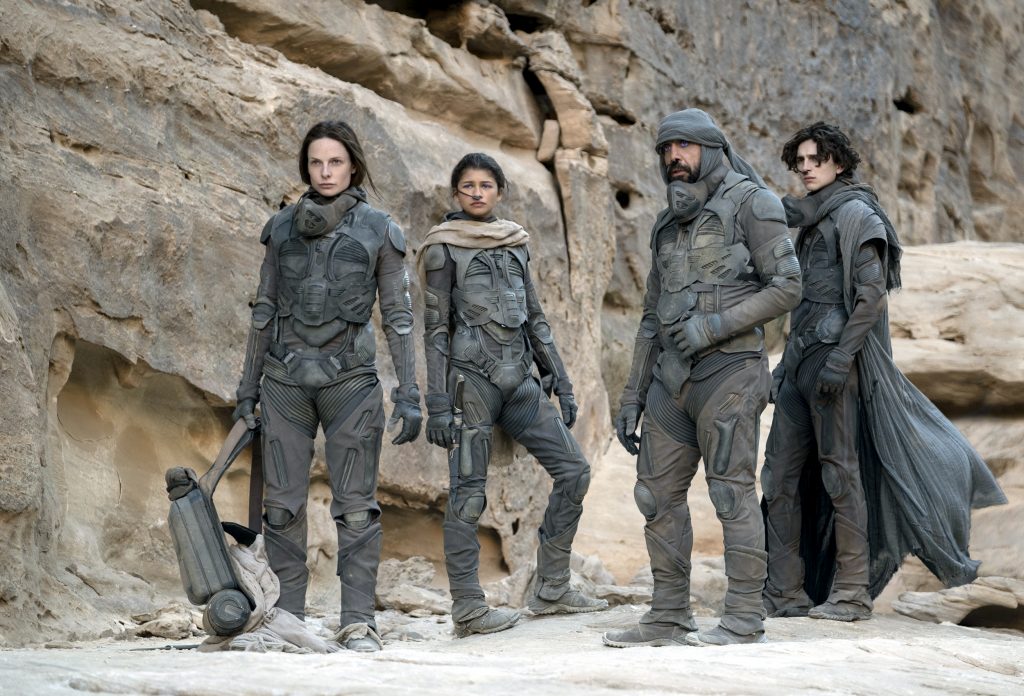
This is my review that was published in the Webster-Kirkwood Times on Oct. 21, 2021.
Lynn’s Take: As far as big-budget cosmic spectacles go, “Dune” is impressive at filling the screen with wonder.
Directed by visionary Denis Villeneuve, who frames everything with meticulous care, as he did with “Arrival,” his only Oscar nomination, and “Blade Runner 2049” – the film is a technical marvel, with visually stunning panoramas and innovative flying machines.
Yet are these characters engaging enough? How much do we care about what happens to these political dynasties? They prefer to whisper in cavernous spaces, and while mesmerizing Zendaya’s narration helps, the project’s mythology on such an epic scale tends to weigh it down with “importance.”
Our hero’s journey is a very long one and we spend 2 hours and 35 minutes leading up to a next chapter. This is only Part One. We are warned at the end, when one character says to Paul: “You’re just getting started.” The payoff isn’t quite there – so when is Part Two?
We have just invested time on an extended prologue. Oh dear. Will only fans of the book be able to appreciate this saga? And isn’t that the true test? As is always the case, those not familiar with the source material will be at a disadvantage trying to keep up with the warring factions.
Considered the best-selling science fiction novel of all-time, “Dune” is gigantic in scope, and the 1965 cult classic touches on themes involving politics, religion, ecology, technology, and human emotion, threading them all together in space.
The empire’s other planets want control of Arrakis for its spice, which is also necessary for space navigation because of its multidimensional awareness and foresight.
“Dune” is only the first in a series, followed by Herbert’s five sequels: Dune Messiah, Children of Dune, God Emperor of Dune, Heretics of Dune, and Chapterhouse: Dune. After his death, others have kept the franchise going.
Its devoted fan base inspired filmmaker Alejandro Jodorowsky to attempt a film adaptation in the 1970s but was cancelled after three years in development. Along came David Lynch’s complex adaptation in 1984, which was a harshly received misguided mess, and a Sci-Fi Channel miniseries in 2000.
While light years ahead of the 37-year-old film, “Dune” does seem to have the same problem in adapting something so unwieldy – that the character development suffers.
It’s difficult to figure out the planetary relationships and who’s who among the different groups, even with a strong cast that attempts to make everything as lucid as possible.
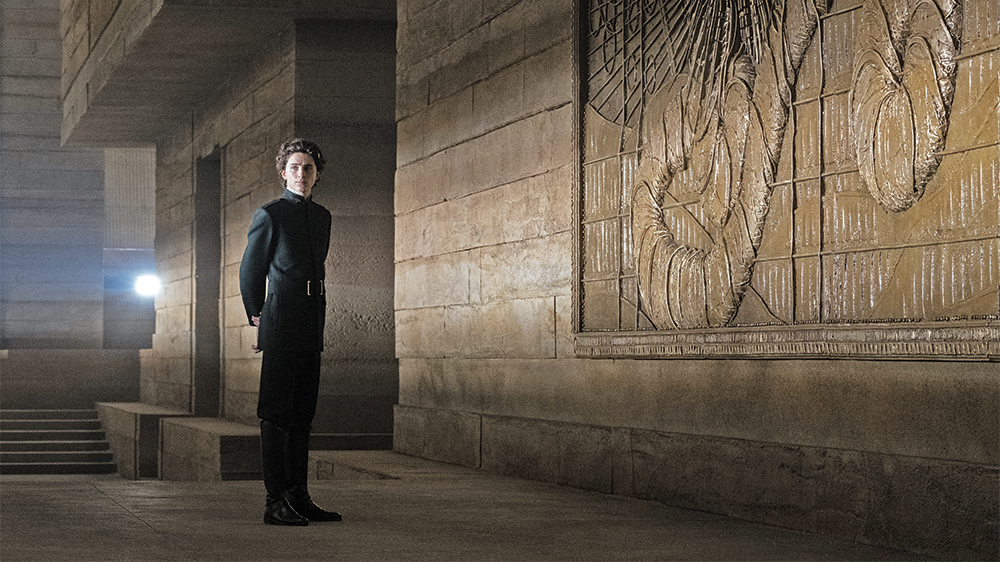
This one does attempt to over-correct in a tedious way, with a screenplay by director Denis Villeneuve, Jon Spaihts (“Doctor Strange,” “Prometheus”) and Eric Roth, Oscar winner for “Forrest Gump,” that still falters in explanations.
Paul is played with youthful elan by Timothee Chalamet, who seems to be working non-stop. His character, burdened by the weight of his destiny, is actually the least interesting of the massive ensemble – but the camera loves him, and he looks good standing in many shots of wind and blowing sands, contemplating.
Chalamet has genuine interactions with his father, an authoritative but loving Duke Leto Atreides, well-played by the always captivating Oscar Isaac. With warm fatherly advice, Isaac tells him: “A great man doesn’t seek to lead; he’s called to it.”
It’s not his fault that his character is a blank slate. Paul is being groomed to take over, and while at times reluctant and confused, he accepts his duties. His mother, all-serious Lady Jessica, is a tough taskmaster, and subtly played by Rebecca Ferguson, they have a protective relationship.
Far more captivating is Jason Momoa as the fierce warrior Duncan Idaho. He brings some oomph to the fighter’s bravado and his fists of fury are legitimate. Momoa and Chalamet convey a loyal longstanding friendship.
Not given much to do is Josh Brolin as Gurney Halleck, the duke’s right-hand man, and Dave Bautista as antagonist Beast Rabben Harkonnen – along with Momoa, they are the recognizable fighters.
A barely there Javier Bardem is Stilgar, a leader of a desert tribe. An unrecognizable Stellen Skarsgard appears, Jabba the Hut-like, as the disgusting despot Baron Vladimir Harkonnen. The Harkonnens are the evil not-to-be-trusted bad guys.
The first hour is full of awe. But why do movies about the future tend to mix medieval and “Star Wars” knockoffs in production design and costumes, similar to the “Game of Thrones”? The color palette is deary shades of gray, beige and black.
While that gets wearisome, the cinematography of Greig Fraser is dazzling. An Emmy winner for “The Mandalorian” and Oscar nominee for “Lion,” he conveys the grandeur of the planet landscapes as well as the more intimate moments in various degrees of light.
He worked on “Rogue One: A Star Wars Story” and the upcoming “The Batman,” so tackling sandworms and spaceships is natural for him. His majestic work is one of the pleasures of seeing this in IMAX.
Hans Zimmer’s score is a stirring mix projecting danger and derring-do in dissonant chords, setting an urgent tone for action.
Despite its storytelling flaws, “Dune” is such a monumental example of state-of-the-art filmmaking that its cinematic universe deserves to be seen on the big screen.


Lynn (Zipfel) Venhaus has had a continuous byline in St. Louis metro region publications since 1978. She writes features and news for Belleville News-Democrat and contributes to St. Louis magazine and other publications.
She is a Rotten Tomatoes-approved film critic, currently reviews films for Webster-Kirkwood Times and KTRS Radio, covers entertainment for PopLifeSTL.com and co-hosts podcast PopLifeSTL.com…Presents.
She is a member of Critics Choice Association, where she serves on the women’s and marketing committees; Alliance of Women Film Journalists; and on the board of the St. Louis Film Critics Association. She is a founding and board member of the St. Louis Theater Circle.
She is retired from teaching journalism/media as an adjunct college instructor.

